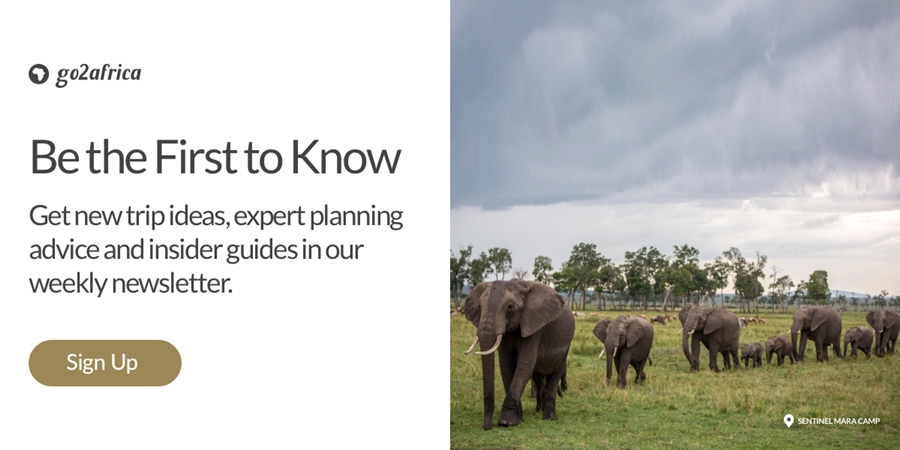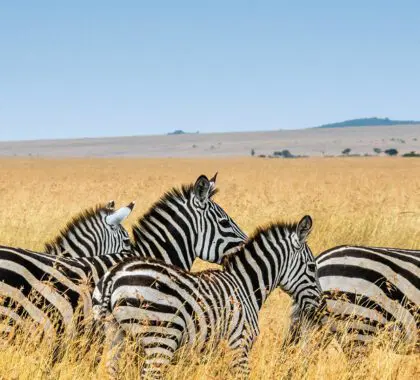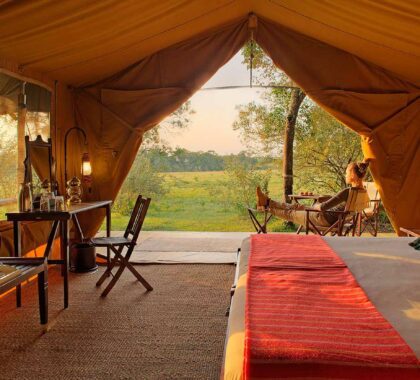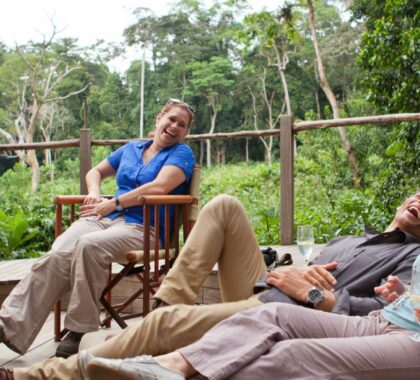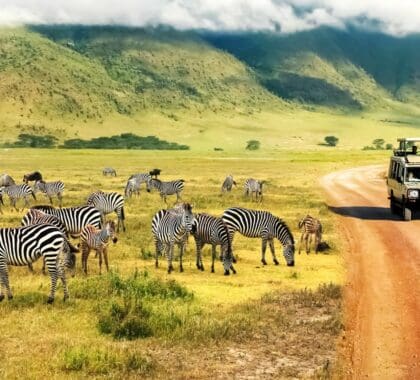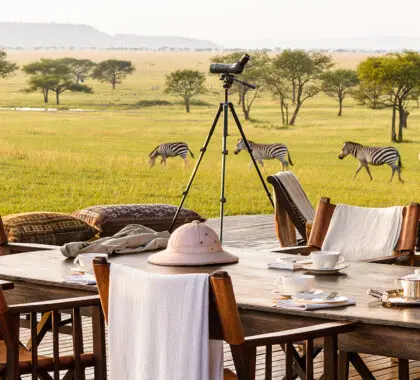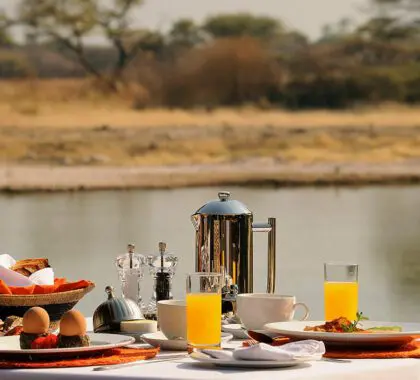Estimated reading time: 18 minutes
Go2Africa is essentially a ‘female company’. Yes, we were founded by a man and have male staff, but the vast majority of Go2Africans are women - and we spend a lot of time on safari!
These are our honest, straightforward and practical tips for other women going on safari for the first time, whether you’re on honeymoon, part of a group or going solo.
Learning About Bucket Showers

‘Bucket showers’ are fairly common on a more traditional African safari. Typically, this is done with a large drum of water heated up over a campfire. Once it’s nice and hot, the staff then hoist it above the shower so you can wash as usual – just bear in mind, it will be a shorter one. Things to keep in mind:
- Bucket showers are mostly found when you are mobile camping or in very remote places. Most upscale lodges have replaced them with regular plumbed showers.
- Your water is limited so plan your shower carefully. If you want to wash your hair, get the shampoo in the minute your hair is wet so you will have sufficient water to rinse it.
- If you want to shave your legs, it’s advised to do so in the sink rather than the shower. We would recommend waxing prior to your safari if it’s something that will bother you.
- Don’t forget to thank the staff member who brings you the water: it’s hard work to get it hot and it’s heavy to carry.
- Plan when you will shower – the staff will generally ask you when you want to shower. As it takes time to heat the water, you can’t have a shower on demand so try and give as much warning as possible. Also keep in mind that the campfire may also be used for cooking food so try and avoid mealtimes.
- Africa is a water-scarce place. Please use fresh water sparingly and make it a habit to switch off taps (faucets) the minute you are finished. Don’t let the water run when you are brushing your teeth, shaving your legs etc. to avoid being wasteful.
How to Deal With ‘That Time of the Month’ in the Bush

Thousands of African women have their periods every day and cope perfectly well without fancy sanitary products or bathrooms. We understand it’s a pain to be dealing with your period on safari, but we have a few suggestions.
- We often get asked “Can you still go on safari if you have your period?” and the answer is: absolutely!
- Remember to bring sufficient supplies with you. If you are due to have your period on safari, please do NOT assume that you will be able to purchase tampons or pads easily. You may be hours away from the nearest shop and there is no guarantee they will stock what you need or what you are used to. Many camps have only male staff so don’t rely on being able to ‘borrow’ items from female staff.
- If you can, bring brown paper bags to put soiled items in for disposal. Do NOT flush them even if your camp has a ‘flush loo’ – the system won’t be able to cope, and you may block it. Rather wrap up everything in toilet paper, put it in a paper bag and put it in the bathroom’s bin. If everything is paper, the staff can burn it later. Most lodges will supply a bag and have a message explaining how the toilet system works.
- Don’t leave used items behind if you go to the toilet on a game drive. Animals have a very keen sense of smell and will come to ‘investigate’ once you’ve moved on (they won’t while you’re there as they’re scared of humans). You don’t want a lion eating what you’ve left behind. Rather bag it all up, put it in a Ziploc bag, pop it in your daypack, and discard of it discreetly when you get back to camp.
- There’s nothing to be embarrassed about, menstruation is normal and also occurs in nature with some primates and canids. Some of our Go2Africans have even had fascinating conversations with male guides about this and it’s considered completely natural.
- Please do NOT put soiled underwear in the laundry basket for the staff to wash – wash it yourself. Camp staff do not wash any women’s underwear (bras or panties) for cultural reasons. There is usually a small pot of washing powder next to the bathroom basin or pack a little eco-friendly handwash in case. Some camps will even have wash lines for you to hang your undergarments on.
What to Do if You Need to Use the Toilet on a Game Drive

This is another commonly asked question: “how do you go to the bathroom on an African safari?”. The short answer? You simply ask your guides.
- As always, don’t be embarrassed. Everyone has ‘to go’ at some point and guides will often explain upfront what you need to do. Some even have waterless hand sanitiser on the vehicle – it may be worth packing your own hand wipes in case.
- Simply tell your guide that you need ‘find a bush’ or ask them if it’s ‘OK to use that bush’. They will know what you want to do – in East Africa (Kenya and Tanzania), many guides use the euphemism ‘picking flowers’ – ‘Do you need to pick flowers?’. They don’t mean literally picking flowers, they mean a toilet break!
- Check the ground around the bush for snakes, lizards, frogs, bugs and monitors – most will move on when they feel the vibration of your walking on the ground. Stomp extra heavily as you approach the bush if you want to make sure!
- Don’t leave behind plastic wrappers, sanitary pads, tampons etc – wrap them and bag them to take back to camp.
- We suggest making a small ‘loo bag’ for yourself with a small bottle of hand sanitiser, biodegradable toilet paper or wipes, and brown paper bags.
- Always go to the toilet at the lodge just before you leave for your game drive – it’s the last plumbed loo you will see for at least three hours!
- Wash your hands thoroughly – waterless hand sanitiser is the easiest way of doing this.
- Don’t wear a jumpsuit or romper! You would have to take the whole thing off, which is very impractical and wastes a lot of time. Bear in mind that no bush is ever completely private and that you may be on the game drive vehicle with strangers, men included.
What to Pack and What to Leave Behind

“What should I take on safari?” is a very valid question, especially for first-time safari goers. There’s always a question of “what shoes should I take on safari?” in particular. Let’s start with the essentials:
- Practical clothes (shorts, trousers, T-shirts) in the following colours: green, brown, grey and khaki. This is not so you look like an extra from Out of Africa, but to blend in as much as possible on safari. The more you look like nature, the more you will see of nature.
- By ‘practical’ we mean cool or warm enough (Africa gets cold!). In many African cultures, the hips and thighs are considered extremely private so think twice about mini-skirts, hot pants or cut-off shorts. This also applies to anything that exposes your midriff.
- Game drives leave in the very early morning or arrive back at camp after dark when it can be frosty and cold. Peak safari season falls in the African winter so pack trousers, closed shoes, warm socks, and a proper jacket. If you’re someone who really feels the cold, we recommend adding a beanie, scarf, and some gloves with textured fingers – so you can still operate your camera!
- When it comes to trousers, the best safari pants for women would be neutral denim, technical fabric such as hiking pants, or linen/cotton trousers if you plan to visit during the summer months. Should you wear jeans on safari? If you can sit comfortably in them for several hours, sure!
- As some of your game vehicles may be open-topped, we can tell you for nothing that the best type of safari hat for women is one with a wide brim that fits snuggly on your head – you don’t want to lose it to the wind! While we love a good ball cap as much as the next person, they leave your ears and neck exposed to the elements and that’s never a fun sunburn.
- Essential toiletries only: sanitary products, toothpaste and toothbrush, deodorant, moisturizer, sunblock, and any prescribed medicines. It may be a good idea to get a note from your doctor detailing what the medication is, especially if it’s been decanted.
- Lip ice – preferably with some kind of SPF protection. Heading out on a game drive means the start of an epic adventure, but also exposure to heat, sunshine and sand, so make sure to stay hydrated.
- Ear plugs. Some women don’t sleep well because the bush can be very noisy at night: hippos chortle, lions roar, hyenas laugh, owls hoot, nightjars call, and bushbaby’s shriek. Nocturnal animals have to rely on sound to communicate since they can’t see, which often makes night-time noisier than daytime.
- If you have one, pack a headlamp or handheld torch. Tents can be gloomy at night which makes packing your bag or finding items difficult.
- A sports bra – this is especially prevalent for our well-endowered ladies. Roads are often rutted and the further you sit back in the game-drive vehicle, the more you will be bumped about. A good, supportive sports bra can make the drive a lot more comfortable. Ensure anything you wear is something you’ll be comfortable in for several hours.
Keep your safari clothes neutral, practical and comfortable. The days are generally warm, but mornings and nights can be chilly so pack accordingly.
Things we recommend you do not pack:
- Blue clothes – they attract tsetse flies. Black clothes – they also attract flies and become very hot. White clothes – they create a high contract for colourblind animals and get very dirty. Bright colours and busy patterns are also a no-go due to their high contrast. Trust us, neutral colours like green, khaki, beige, brown and grey are your friends – we promise we’re not trying to turn you into Indiana Jones.
- Clothes that have animal prints. Not only is this a fashion faux pas, but monkeys have been known to sound alarm calls when they spot ‘leopard’ print, scaring off other animals.
- To answer the “can you wear perfume on safari?” question that crops up now and then, we would say no. Any strongly scented perfume, hairspray or body spray are likely to ward off animals due to their unfamiliar scents. If you would like to wear something, try an essential oil mix or a very muted scent that smells fresh rather than sweet or musky.
- Revealing clothing – rural Africans are typically modest and dress conservatively. ‘Sexy’ clothes will make you look out of place in the bush. In other words, even if it’s your honeymoon, save the lingerie for the privacy of your own tent.
- Hairdryers, curling tongs or hair straighteners. Most camps don’t have sufficient electricity suppliers to power these items. Camps that run off solar power or generators will not be able to power these items and you could accidentally blow the whole camp’s power supply. Some camps have their own hairdryers or permit guests to use them, but this isn’t always the case. These items are also heavy and will impact any potential limited luggage allowances – often smaller, internal flights require light packing.
- Lots of jewellery, high heels, handbags and so on. Very few places insist on a dress code for dinner and, even then, it is relaxed, and no-one will blink an eye at you wearing trousers and a fleece for dinner.
- You will not need to pack your own towels, pillows and so on.
- Rompers, jumpsuits, onesies and other one-piece items of clothing are very impractical for bush breaks to use the loo.
What to Wear

Game drive: neutral clothing – think khaki or grey trousers or shorts with a similarly coloured t-shirt, fleece or shirt; comfortable trainers or sandals; sunglasses; sunblock of SPF 30 or more; biodegradable insect repellent; hat or beanie; gloves; scarf or buff.
Around camp: the same or, if you feel like a change, a cool, loose dress or skirt. You are welcome to wear bright colours or patterns at camp, but you may find that with the luggage allowance, it’s easier to just pack neutral colours. The same safari guidelines apply for camp with regard to revealing clothes.
If you’re looking for more specific information, have a look at our guide on what to wear on safari in Kenya. Alternatively, if you’re lucky enough to experience it, check out our blog on what to wear gorilla trekking. Have a look at our infographic for further information.
No Hairdryer? No Problem!

No matter the time of year, Africa is generally warm from mid-morning to mid-afternoon, even during winter in peak safari season. If you can, try to wash your hair after the morning game drive or nature walk as this will give you enough time to settle down in a sunny spot with a book, and binoculars on standby, while your hair dries in the sun.
Don’t get too hung up on appearances. Relaxing your routine is a big part of what makes a holiday in Africa so liberating. The same goes for make-up. If you want to wear something, mascara and lip-gloss are more than enough on safari.
African Customs and Culture
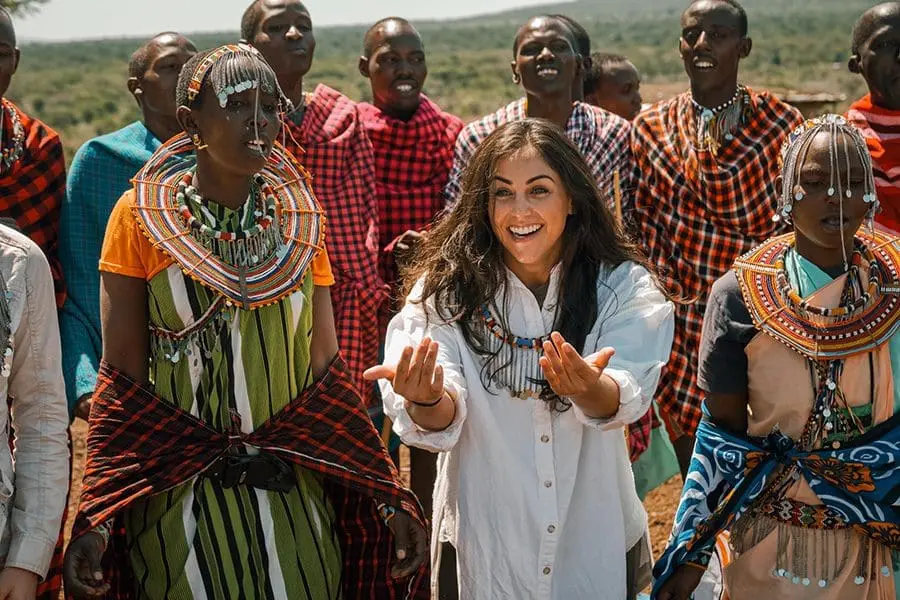
Staff at safari lodges work with female guests from across the world every day of their lives and treat everyone with respect.
- Be gracious when staff offer to carry your bag, refill your water bottle or assist you into the vehicle. In Africa, offering assistance is a sign of respect and that you are liked; accepting it shows that you appreciate and acknowledge the courtesy being afforded you. Yes, we know you can ‘do it yourself’ but the staff want to make your time with them as pleasant as possible.
- Dress modestly. This does not mean you have to be covered from head to toe but do cover everything from your lower thighs to your shoulders when you’re on a game drive or around camp.
- After your swim, put on a wrap or clothes – it’s advised not to stroll around in your swimming costume due to the conservative nature of certain cultures.
- It is considered good manners to greet the person and enquire how they are before you ask for something. Saying, ‘Good morning, Thabo, did you sleep well? Please could I have a cup of coffee?’ will endear you far more than, ‘Get me a cup of coffee’ or just ‘I want a coffee!’.
- Staff generally enjoy having a laugh and have a good sense of humour about romance, drinking, having children and so forth but keep it general. Sharing stories is always fun, but deeply personal information or traumatic experiences should be reserved for your travelling partner – if you have one.
- You are welcome to have a drink and indulge in a glass of wine with lunch, a G&T on your game drive, a drink at dinner with a nightcap. But being obviously drunk is bad form, for both men and women. It’s not a good idea to drink heavily on safari anyway as the wake-up calls are very early and having a hangover in the African sun is, understandably, extremely unpleasant.
- No matter how much fun you are having, please try and go to bed at a reasonable hour. The staff cannot let you stay up in the boma or mess tent alone and they have to do after-dinner prep and be up earlier than you to load the vehicle, get breakfast ready etc. It is considered rude to go to bed super late and expect everyone else to ‘entertain you’. Yes, you are ‘paying for it’ but a good safari relies on teamwork, and you are an essential part of the team.
Safety on Safari

Safety on safari is everyone’s duty. It’s important to listen to your guide or ranger and always obey instructions given by the staff. They have years of training and experience, especially in predicting the behaviour of wild animals. Your safety is their foremost concern so please obey their instructions.
- Never, ever take food back to your tent or leave food lying around. Wild animals have a very keen sense of smell and are driven by the need to eat. If you have brought food with you, do not open the packaging, or hand it to the kitchen staff for safekeeping.
- Always zip up your tent or close the door to your suite when leaving. Not doing so is a common rookie mistake. Baboons and monkeys love ransacking tents and will easily slip through an open door or window. Animals seek out shade, warmth or dryness, which makes your space a perfect hiding place if left accessible. If you get back to your tent to find an animal in it, do not panic. Walk away quickly and quietly, and alert a member of staff who will remove it safely.
- It’s important to note that not all camps are fenced, and many are left open to allow animals to pass through on natural migration routes – fences don’t keep out inquisitive monkeys that can leap from tree to tree or roof to roof. If you are in an unfenced camp, you will be allowed to walk around alone during the day but not at night. Watchmen or askaris will escort you to and from the mess tent at night. Some of them may be villagers who don’t speak much English, but they are extremely alert to the sounds of the night. Remember that sound travels further at night: it might sound like the lions are roaring or contact calling right outside the camp but in reality, they are likely to be miles away and are simply projecting their calls to communicate with other members of the pride.
- Almost all camps have some kind of alarm in case you have an emergency in your tent like a whistle, hooter, telephone or walkie-talkie (two-way radio). It is unlikely you will ever need to use it. If all else fails, simply shout as loudly as you can – the staff will hear you.
- Do not go swimming in rivers or lakes unless you have permission from the guide – you could disturb crocodiles, hippos, ecosystems and water birds or pick up bilharzia.
- Although social media and certain safari advertising show people sitting on the roof or in front of a game vehicle, photos like this typically take place at a sundowner session or back at camp. This may be permitted in some cases and not in others so please check with your guide first, they’re usually very happy to accommodate guests as long as it doesn’t put you in danger.
- We feel it goes without saying but just to reiterate it, please don’t try to attract wild animals and attempt to feed or touch them. They may be used to safari vehicles but are by no means domesticated or approachable.
If you’re interested in learning more, here is some additional travel safari advice for LGBTQ travellers.
Food for Thought


Spending time on safari usually means trying new things – every place you visit will have a private chef, or culinary team, that work hard produce delicious meals throughout your stay. While international fare is fairly common, there will more than likely be a few local favourites thrown in there and we recommend trying everything.
Typically, a camp experience will follow a certain rhythm throughout the day when it comes to game drives and food. The usual safari mealtimes are as follows:
- A wake-up call with coffee and biscuits (cookies).
- A refreshment stop on the morning game drive with hot drinks and maybe a snack. Sometimes this might be a full cooked breakfast out in the bush. If you are hot-air ballooning, expect a full champagne breakfast with everything from omelettes to pancakes.
- Refreshments or brunch when you get back to camp.
- Depending on breakfast or brunch arrangements, you could have lunch instead.
- Afternoon tea is a safari tradition. Just before your afternoon game drive, tuck into coffee, cakes, biscuits and other treats like pies or tarts.
- A refreshment stop on your afternoon game drive, usually for sundowners, with drinks and snacks (everything from dried fruit and nuts to biltong, chips, samosas and so on).
- A drink when you get back to camp.
- A multi-course dinner.
Some lodges are cutting down on the amount of food they serve – afternoon tea, for example, might be a light cake rather than six different types of pastries. You aren’t obliged to eat everything but it’s hard not to sample everything – you are on vacation, after all, and the fresh air does work up an appetite. All meals may be buffet or a la carte, depending on the lodge – feel free to decline courses like soup or pudding if you aren’t hungry.
If you have strict dietary requirements, let your Africa Safari Expert know during the consultation process. Most camps can cope with vegetarians fairly easily but if you are vegan, have coeliac disease or need kosher or halaal meals, then be sure that the lodge is able to do these before you arrive.
Shopping on Safari


You can find some amazing things to buy on your travels – depending on where you stay and what you have access to, of course. Yes, you can shop for amazing things on safari – depending, of course, on your taste and the camps you visit. Members of our team have bought beautiful, simple bronze jewellery in the Masai Mara, stunning silver jewellery in northern Mozambique and plenty of amazing goodies in Nairobi, to mention a few. The beauty of shopping in Africa is that a lot of items are handmade or recycled and often benefit local communities, especially women who may have extremely limited education or the chance to earn their own money.
A few of our safari shopping tips:
- Carry US dollars. They are almost universally accepted. If you do exchange for the local currency, get low denomination notes so that the lodge can give you change easily.
- Support local communities or charities as much as you can. In Africa, each employed, or income-producing person, supports up to seven other people – your shopping can go a long way.
- Things to buy: clothing, traditional cloths, jewellery, books, ornaments, beadwork, tea, coffee, lotions made with traditional ingredients like rooibos, beautiful soaps and so on. Africa is awash with precious stones and metals so look out for gold, diamonds, tanzanite, platinum, Mozambican rubies and so on but ensure that they are ethically mined (choose ‘conflict-free’ diamonds, for example).
- Illegal or unethical items you should not buy: rhino horn, ivory, items made with hardwoods as rampant deforestation is leading to habitat loss for several species. Please avoid buying any pelts, furs, or bones as this encourages the illegal wildlife trade.
- Haggling is not a major ‘thing’ in Africa. The items in shops will be priced, just like a regular store back home.
- If you visit a market, like the ones at Victoria Falls, ‘haggle’ in a good-natured way and don’t try to drive a hard bargain with the sellers. Zimbabweans are impoverished: trying to save USD10 or USD20 isn’t going to mean much to you in the long run, but USD20 is a lot of money in Zimbabwe and makes sure the seller’s family has food and shelter that week.
- The market sellers will sometimes offer an ‘umbrella price’: this means one price for all the different items you are buying.
- When you visit a market, try to buy from the sellers at the back of the site. They get the least foot traffic and often make the least sales.
- In Zimbabwe, some market sellers will be willing to swap things like toiletries, stationery, clothes and shoes for their wares. This is a good option if you’ve run out of cash but have spotted something you like. If you are flying from Vic Falls to Cape Town or Johannesburg, you can easily stock up on the razor blades, shampoo, socks, T-shirts or pens that you swapped for something more exciting!
Will There Be a Spa?
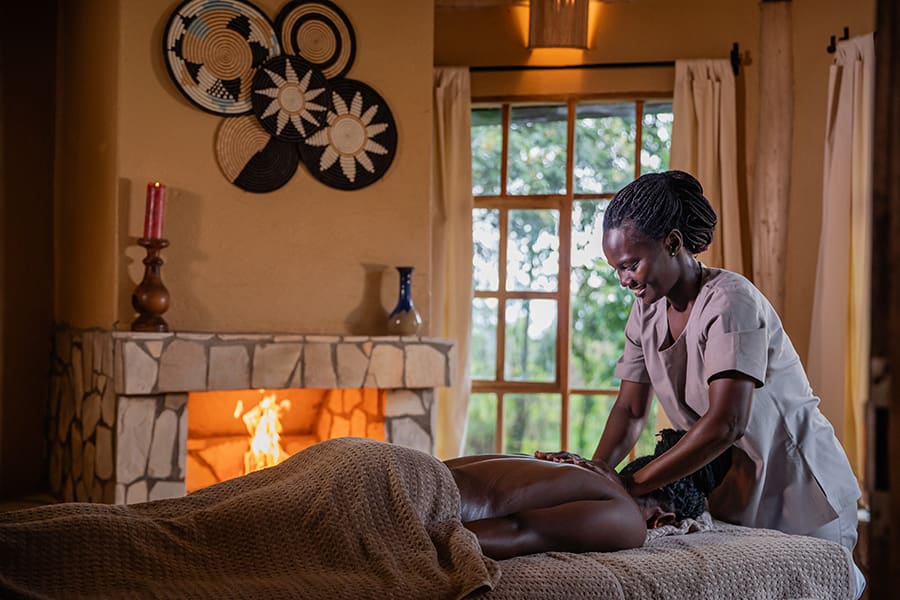

If having a massage or manicure is important to you, then tell your Africa Safari Expert that you would like to stay in a lodge with a spa, or access to beauticians, as not all places have them.
- A ‘spa’ can mean a grand building with all the latest gadgets, cosmetics and treatments or a simple banda in camp. Please check in with your African travel expert to ensure you understand what to expect.
- The treatments are almost always undertaken by young women. Not all of them will have formal training or be able to speak fluent English and may be shy.
- The most common treatments are massages, manicures and pedicures as these require the least amount of technology. It’s unlikely you will be able to have advanced beauty treatments like waxing, Botox or threading.
- It’s always nice to tip your spa therapist, either directly or in the communal staff tip box on checkout.
- The same rules apply in Africa as elsewhere: keep your lower undergarments on if you are having a massage.
Ready To Start Planning Your Safari?
Contact one of our African Safari Experts to start planning a tailor-made safari adventure, designed with you in mind. Whether you’re going solo, or with someone else, our experts will help you design the perfect trip.

